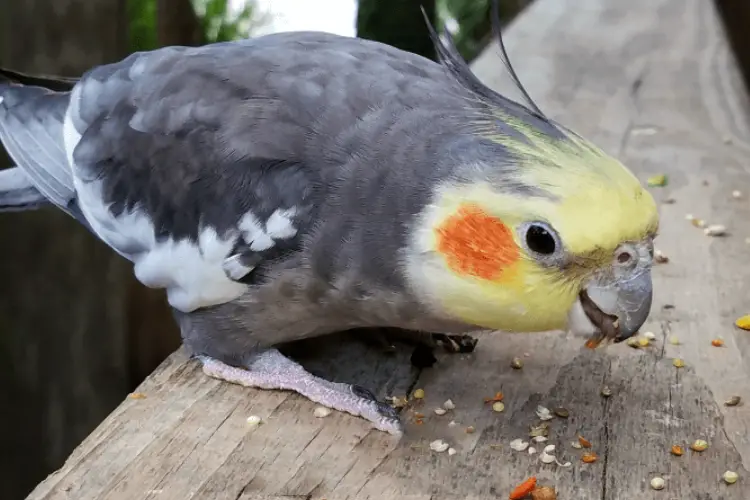If you have owned a cockatiel for some time now, you can estimate how much it eats daily. So if the cockatiel suddenly starts eating more than usual, you may wonder what might be the cause. Most cockatiel owners will be excited that their bird has a high appetite and may even provide it with more food. However, is it a good thing?
Why is my cockatiel eating so much? When they are hormonal and bored, cockatiels will eat a lot. If there is nothing else to do in the cage, the cockatiels will focus entirely on the food bowl. Furthermore, if the diet is poorly balanced, the cockatiel will become malnourished, which may cause it to overeat to compensate for the malnutrition.
Overeating is a serious issue that can make your cockatiel develop serious health issues like obesity. This article will discuss everything about why your cockatiel is eating so much.
Why Is My Cockatiel Eating So Much?
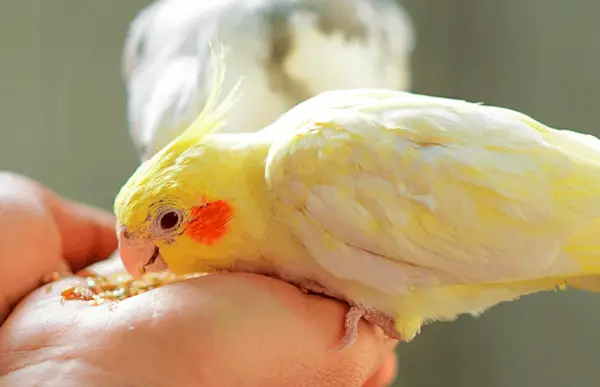
Cockatiels may eat a lot due to several reasons. They include;
Lack of mental stimulation
Cockatiels are very social birds and need entertainment in their daily lives. If you give them no attention, cockatiels will start overeating just to keep themselves busy. To prevent this, you can encourage foraging. In the wild, cockatiels will forage for their food which is more entertaining than consistently eating from a food bowl.
Poor nutrition
If the cockatiel is malnourished, it tends to overeat. A one-food diet can cause the cockatiel to miss certain nutrients from its diet. For example, if you serve an all seed-diet every day. Seeds are high in carbohydrates but miss out on other essential nutrients.
In addition, cockatiels digest their food very fast due to their high body metabolism. So if the cockatiel feels like its body is not getting enough nutrients, it will continue eating to find the missing nutrients. A balanced diet is the most common way to prevent overeating.
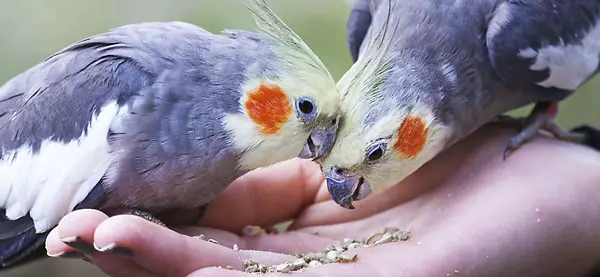
Also, if the cockatiel has a digestive tract issue, it can suffer from malabsorption. This is where the stomach does not fully absorb food into the body. The cockatiel will then overeat to receive enough vitamins and minerals.
Hormonal issues
This is especially common during breeding seasons which are in the spring months. The cockatiel’s body requires more minerals and vitamins in preparation for nesting. Female cockatiels use a lot of calcium when laying eggs, so they might overeat to replenish the lost calcium.
Diet
When feeding your cockatiel, you need to consider what you offer them. Some cockatiel owners provide fruits and other treats frequently. That makes the cockatiel develop a preference for them its regular diet. For example, if you give the cockatiel a pellet diet and strawberries, the cockatiel will eat the strawberries leaving the pellets.
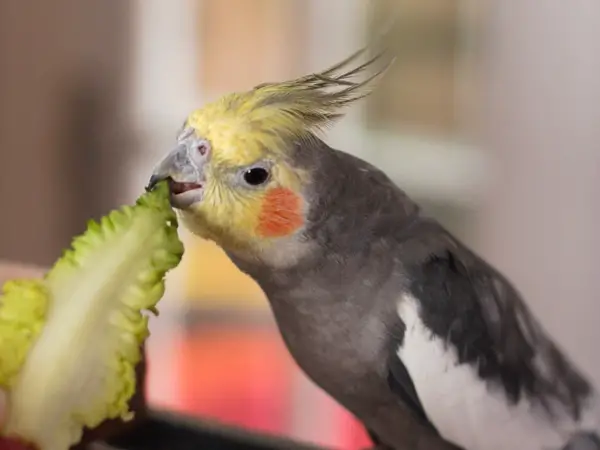
If a cockatiel overeats, it might become obese, leading to health issues. It is critical to supply your cockatiel with a well-formulated diet and occasional fruit for them to maintain a healthy weight.
Parasites
When a cockatiel has parasites, it eats a lot. Parasites tend to leach nutrients from the cockatiel’s system, leading it to overeat to replenish lost nutrients.
How Much Does a Cockatiel Eat a Day?
You should feed cockatiels a quarter cup of pellets per day for baby cockatiels and a half cup for adult cockatiels. A half cup of pellets contains 30 to 40 grams of pellets.
The smaller the portion of fruits and vegetables, the better. If your bird eats so many fruits and veggies that it misses its primary meal, it could become malnourished and even obese.
Provide a half to one teaspoon of fruit to a baby bird and a tablespoon of fruit to an adult cockatiel. Offer half a teaspoon of vegetables and a half tablespoon of a protein source to baby cockatiels for vegetables.
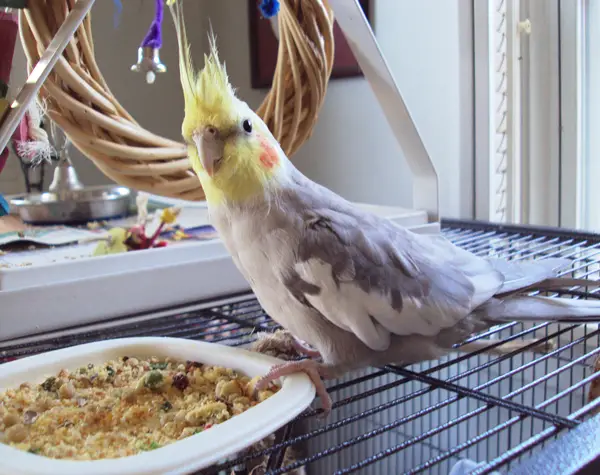
Serve a small spoonful of vegetables and one and a half teaspoons of protein to your adult cockatiel. You should only serve fruits and vegetables twice or three times per week. This prevents the cockatiel from becoming attached to them.
Common protein sources include boiled or scrambled eggs, whole grain bread, and sprouted legumes. Protein should make up only 8% of the cockatiel’s diet.
Also read: Cockatiel Mating Behavior
How To Stop Cockatiel From Overeating?
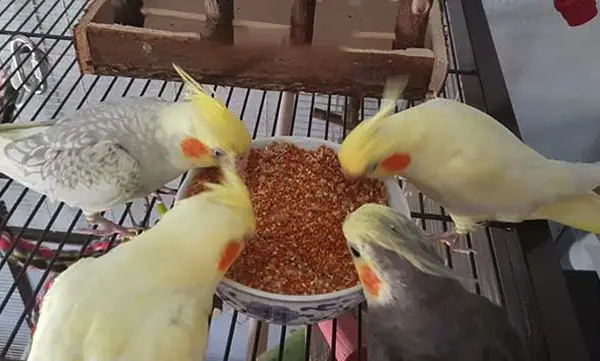
Here are a few ways you can prevent your cockatiel from overheating.
- Add puzzles, toys, and another cockatiel to the cage. That way, your cockatiels will not be bored or lonely. That will divert their attention from bad eating habits. You can also spend time with the cockatiel to ensure it does not overeat due to lack of attention.
- Encourage foraging. Foraging makes the cockatiels burn calories while looking for food. You can hang the food from the perches or place it between cage bars. You can also fill a food bowl with clean pebbles and scatter seeds in between the stones, so the cockatiel has to search for food.
Foraging not only makes the environment natural, but it also ensures the cockatiel remains mentally stimulated, thus less overeating. Overforaging, however, can result in the cockatiel eating a lot, so don’t scatter too much food in the cage.
- Make sure the cockatiel gets a balanced diet and plenty of fresh water. Purchase a high-quality pellet diet and provide fruits, vegetables, and protein. Cuttlebone can also be added, especially during the breeding season. The female cockatiel will get enough calcium this way.
- Provide treats such as fruits and vegetables occasionally. That way, the cockatiel will not prefer treats to its regular diet.
- Keep the cockatiel’s cage clean to eliminate any parasites from creeping in. remove any leftovers and clean the food bowl regularly.
Do Cockatiels Stress Eat?
No, cockatiels do not stress eat. When cockatiels are stressed, they forego their meals. The cockatiel might be stressed due to being in a new environment, predator presence, or lack of enough sleep.
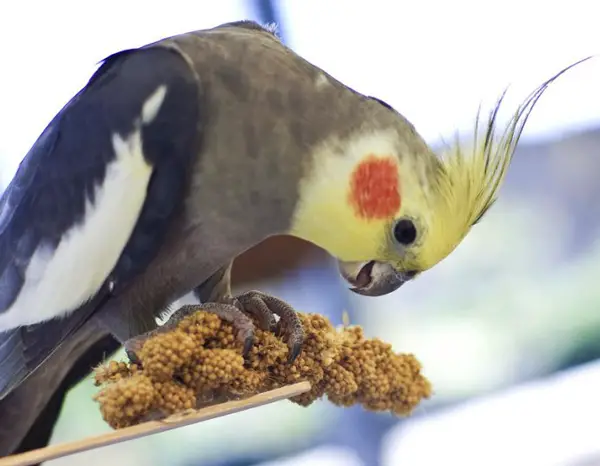
Cockatiels are most vulnerable when eating. So they will remain hidden due to fear and only eat when they feel safe enough. It is advisable to look for the stress trigger and eliminate it because cockatiels cannot survive without eating.
FAQs
Here are other frequently asked questions.
Yes, they can. As I have explained above, cockatiels might overeat due to boredom, malnutrition, hormones, and parasites. So, ensure you understand why the cockatiel might be overeating and correct it. Provide the cockatiel with a balanced diet and ensure you add toys to its cage to curb the overeating issue.
When cockatiels overeat, they develop health complications such as obesity. Obesity occurs when the cockatiel eats a lot of fatty and sweet foods. So ensure you feed the cockatiel with a balanced diet with less fatty food. Keep fruits to a minimum because some fruits contain high sugar, which might lead to obesity.
Related: Why Is My Cockatiel Grinding Its beak?
Conclusion
So, why is my cockatiel eating so much? It might be due to malnutrition which you can curb by providing the cockatiel with a balanced diet. It can be because of boredom. In that case, give the cockatiel toys or a companion and encourage foraging. The ideal food for cockatiels is 30-40 pellets daily for an adult cockatiel.
